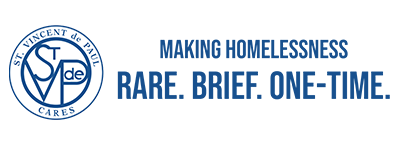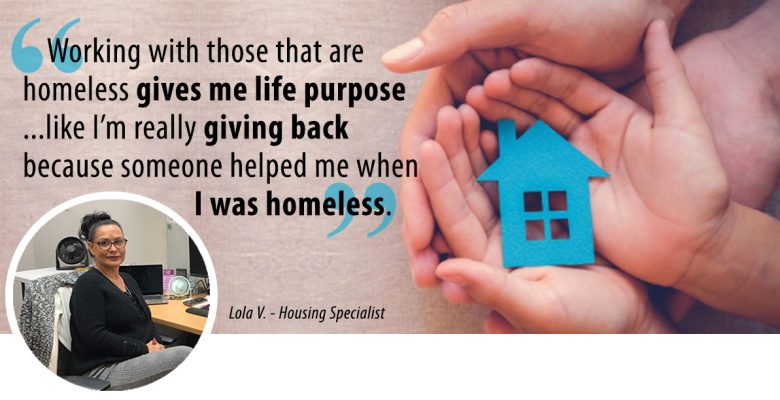Meet Lola. Housing Specialist extraordinaire with more than 10 years of social service experience.
Lola has been with St. Vincent de Paul CARES for 1-year as a housing specialist, the only one, in fact, that works with all 3-housing programs: Rapid Rehousing for both veterans and families and SEHA. A typical caseload is 10-15, but Lola has 3, which means she is a ROCKSTAR that works to quickly and efficiently house those that come into her care. During her interview, Lola speaks about her personal experience with housing and what it’s like being on the “front lines of homelessness” throughout the many stages of the pandemic.
What made you want to work in this field.
Lola: I have worked in social services for many years on and off, and it feels like I am making a difference one family at a time. I also was homeless in my life, so working with those that are homeless gives me life purpose…like I’m really giving back because someone helped me when I was homeless.
Lola moved to the area with her 5 children in 2000, fleeing a domestic violence situation; her youngest was 3-months old. A local housing organization helped move her into a low-income apartment complex.
Lola: When we got there, we didn’t have anything. My son had a crib, and the rest of us were in sleeping bags. A woman from a local church came to speak with me and within a week, my apartment was fully furnished. I still think about it and cry happy tears. From there I took a job at the apartment’s housing center, where I worked until we were told the complex was shutting down. That’s where my journey into social services began… I was able to find homes for 398 families.
From there, Lola worked for another housing organization that focused on homeless prevention and new housing. Before the onset of COVID, she decided to take a step back…
Lola: It was starting to affect me emotionally, and I was getting burnt out. But after about a year of working in a different industry, I felt called to give back again and that’s when I found SVdP CARES. Now I make sure to take time every day and use healthy ways to relieve my stress. After my day I sit in my car for a few minutes, collect my thoughts, and I leave it all in there.
What effect did COVID have on your job initially?
Lola: It was very difficult and scary at first. But then I thought, they’re scared too. And if I was in their shoes, I would want someone to help me. So I just pushed myself forward and I did it…I took the right precautions… socially distanced, wore a mask, made others wear a mask around me, ALWAYS washed my hands. Then after a while, it wasn’t as scary. But I had to work, I had to give back…this is my passion
Has that changed over time?
Lola: Health-wise, my fears have changed. Everyone has different comfort levels, and I think it’s important to meet everyone at whatever level they are at. Now financially, I am afraid my landlords will increase rent significantly like others have…not just for my clients, but for myself!
Did you notice an increase in the homeless population?
Lola: I feel like the homeless population has increased due to the rent increase and family’s not being able to afford what the increases are.
How did the lifting of the eviction moratorium impact what you do and those you help?
Lola: The lifting of the moratorium has placed more families on the streets and more families are ‘couch surfing,’ though the state does not consider that homeless! It’s like a double edge sword… many of the families had a choice to save money since they didn’t have to pay rent at the time. Some couldn’t because they weren’t working or were receiving minimal unemployment, or there are other circumstances. I saw many families that did save and were able to stay in their homes with some assistance, and I have seen others that got evicted as soon as the moratorium was lifted. The moratorium was good to have, as there were a lot of people that were without jobs, but once they were able to get back to work then it became a choice to do the responsible thing and talk to the landlord and try to work something out.
Did this affect the landlords?
Lola: Oh yes, and the landlords have to pay mortgages, taxes, insurance…so it’s not fair to them. I have also seen an increase in ‘investor landlords,’ those that live out of the area and invest in a building.
One she cites as an example is from Orlando, and wants to rent a portion to SVdP CARES, but some of his rental prices aren’t feasible to sustain the self-sufficiency of those housed once they exit the RRH program.
All it took was a conversation to explain to him how our program works, and he was willing to work something out. I emphasized that a percentage of his units would always be full and paid for through SVdP CARES, which saves him the headache of finding tenants or keeping tenants in the economy the way that it is. You have to appeal to their business side. It’s not so much ‘selling the program’, as much as it is advocating for the people we serve.
Is it hard finding landlords in the current economy?
Lola: I have a few landlords that I use repeatedly… once you build a relationship, it’s beneficial to both to continue working with them. But overall, yes, it’s been hard finding new landlords. Many have had bad experiences with low-income tenants, so I have to really convince the benefits for them.
Lola also explained her job isn’t necessarily over once she houses a family or individuals. She still has to maintain the landlord relationship, so that if a problem does arise with a tenant, the housing specialist can work with the case manager to help alleviate the issue and keep everyone happy and housed.
There have been many reports about rent increases and numbers of people flocking to Florida. When did you first start to see rents increase?
Lola: I really noticed a spike towards the end of 2021, around November. A 1-bedroom would go for $1,000 in lower-income areas, and now they’re going for $1,400! It’s already low-income, so it’s almost impossible for someone to afford that on their own, so now I fear we’re going to see a lot more evictions. Also, many of these newer ‘affordable’ complexes are saying your income should be three times the cost of rent… I don’t even make that, and I’m working 2 jobs!
Do you think the influx of people moving into Florida has impacted what you do?
Lola: Yes. More people in need means more nonprofit money needed to handle this influx. But to be honest, I haven’t noticed a common reason; everyone’s story is so different.
What challenges, if any, are you facing today in so far as finding affordable and available housing compared to pre-Covid?
Lola: One issue we are having is that many new landlords are asking that an individual’s income equal three times the price of rent! We’re also seeing that a lot of the private landlords are mimicking these larger complexes and raising rent based on this income rule. In some instances, we have to pay double deposits just to keep up. With the rent already being so high, how will those that we serve sustain themselves once they have completed the program? What they’re asking for is not realistic. This is another reason why it’s so important to foster relationships with landlords so that we can have open dialogues about these issues.
Do you have any idea of the impact you make in the lives of others?
Lola: I do, but they have such an impact on me! I house them and I give them a soft handoff to the case manager. At that point, they’re technically off my caseload, but I still have a connection with them—some still call me to talk! And it’s nice to get those phone calls…to know how they’re doing and that they’re thriving. In fact, after this, I’ll be driving and helping drop off some furniture to someone I housed a few weeks ago.
Anything else you would like to share?
Lola also touched on working to have compassion for those she houses. Many of them have been treated poorly or have been unfairly judged at times in their lives; many are in survival mode and can be combative, doing what they can to survive.
Lola: I have an approach where I keep it real with them…I will be transparent with you if you will be transparent with me. I am not here to judge you, I am here to help you. I focus on the positive with them and not the negative. I tell them that I am going to get them housed and that they are a part of this and we need to work together.
From there, Lola explains that most people put their barriers down and she is able to assess the situation and work with them on their needs, the landlord’s needs, and what it will take to get them housed.
Lola: We find that involving those we serve in their housing gives them a sense of purpose. Because they’re involved in the process, they tend to take better care. And you have to remember what may be good for one, may not be good for another, so you have to be patient if they say no to multiple units before they find their perfect one. Some are easier than others for sure. And if I let them have the choice, they appreciate it more, they’ll take care of it more. You go from a place of struggle and strife for so long, and now you have this sense of empowerment… you’re taking your life back.
End Homelessness
for neighbors in need throughout the community
Lola and her fellow housing specialists have helped thousands of neighbors in need into housing. Stay tuned for our spring appeal where you will hear the inspiring story of a family Lola recently helped to house.

